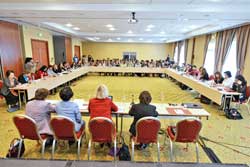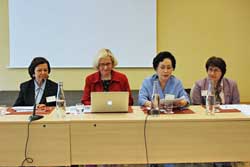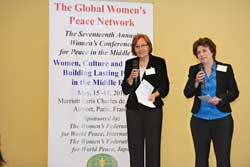2013 Switzerland
Empowering Women and Fostering Universal Values for a Culture of Peace
CAROLYN HANDSCHIN
MAY 15-18, 2013 - UNHQ GENEVA, SWITZERLAND
17th Annual Women's Conference for Peace in the Middle East
Over 80 women leaders and experts from twenty one countries gathered for the 17th Annual Women's Conference for Peace in the Middle East organized by WFWPI. The theme, Empowering Women and Fostering Universal Values for a Culture of Peace was decided based on more than a decade of attention given by WFWP programs and activities to the vision for peace set forth by Paris-based UNESCO's Culture of Peace program. Discussions around the tables were already providing insight into the theme before the formal opening of the program.
One participant from the Gulf States was overheard describing how she had been able to turn around her son, who was being tempted into a life of fanaticism and near suicide at his university. Her daily alertness and concern for her son could allow her, with the whole family's participation, to catch the right moment and pull him back into their protection. Many similar stories were told, although not all with happy endings. What surfaced over and over again was the role of women, especially as mothers, in passing on values and norms. Core values seemed to be so easily agreed among us, although we came from very diverse cultural, religious, professional backgrounds and age ranges.
The first plenary session, Dignity and Human Rights at the Center of a Culture of Peace was opened by the Director of WFWPI's UN Office, Carolyn Handschin. She posed a question that set the gauge for the outcome of the conference, "How can the influence that women have in the transmission of culture and values as mothers and as leaders assist in substantially building communities and people of peace"? She then referred to a quote from the UN Special Rapporteur on Cultural Rights, Farida Shaheed. We must "shift the paradigm from one that views culture as an obstacle to women's rights to one that seeks to empower (not subordinate) women with the authority to determine which traditions should be respected and protected and transmitted for future generations".
Dr. Lan Young Moon was introduced as the WFWPI President. She explained that solving problems demands a comprehensive approach, referring to the need in this new multicultural era to make a place for shared leadership between men and women. Resolving problems cooperatively, with an investment of heart and sacrifice, not always a popular concept, is the new paradigm for the 21st Century.
Dr. Amal Osman, a constitutional law professor in Egypt and former Deputy Speaker of the People's Assembly, explained that the values, attitudes and traditions that women pass on need to be rooted in freedom and democracy. The quality of education, formal and informal, will be a measure of the sustainability of peace. We cannot end violence and division without knowing the root causes. The freedom of women to be involved in associations and NGOs and have access to decision-making is essential to peace in any nation.
Other speakers in the session included Dr. Vera Baboun, the current mayor of Bethlehem and a lecturer at University in Bethlehem. She explained that women have the means to create a new comprehensive understanding of peace that includes completion between men and women, not competition. We need to first learn to speak truth to ourselves, and then speak truth to power. Though it is almost unimaginable, we can even make dignity flourish under occupation and transmit it to our children. Dr. Sonia Ramzii, former Head, Promotion of Cultural Heritage at UNESCO defined the prerequisites for Culture of Peace. Ambassador Mervat El-Tallawy, Chair of the Egyptian Council of Women and former Minister of Social Affairs gave a clear snapshot of the current situation in the Arab world, especially as it concerns women. She reminded all present to collect and refer to statistics as a powerful tool and encouraged the many young women to engage themselves publicly and politically.
Session two, Women's Empowerment and Culture of Peace in the Middle East and North Africa Region was chaired by Ms. Nada Abdallah, expert from the UN Residents Coordinating Office in Lebanon. Judith Karp, Former Deputy Attorney General in Israel and Former Vice Chair of the Committee on the Rights of the Child was the first speaker. She explained the role of human dignity in the framework of a culture of peace. It is an everyday aspect of life, the nucleus of the spirituality of being a human being, not just a legalistic terminology. Other speakers include Professor Hayal Koksal, who lectures on nonviolence in education and curriculum development in Turkey at various universities, teaching students and trainers to become bridge-builders with clear strategies toward peace.
Fatemeh Al Acrough, a specialist at the Ministry of Higher Education in Kuwait, the final speaker of the session, referred to the role of Eleanor Roosevelt at the time of the drafting of the Universal Declaration of Human Rights. Many governments have drawn from the UDHR to develop their own constitutions. Kuwaiti women only gained their rights in 2005, but since then there have been serious steps to implement. In May of this year, the Kuwaiti government passed a law to coordinate everything according to the international human rights framework. It is a part of our culture; however, to raise our families believing that values taught and lived well at home will be our surest protections.
Sessions continued over two days. Themes included, Challenging the Culture of Peace: Education for Universal Values and Promoting the Culture of Peace: The Future. Speakers included representatives of UN Agencies, governments, academia, human rights institutions and civil society organizations. Reports were made to the conference about ongoing projects in the Middle East, born of this conference over the years.
Drawing from the the conclusions of the conference, especially the interactive working groups, the Paris Communiqué was issued.
"In light of the recent developments and times of uncertainty in the Middle East, witnessing a real regression in human rights and a growing alienation and marginalization of women, participants came to realize that change can only happen from within, starting with shedding victimization and regaining their dignity and self-empowerment, pre-requisites to foster a culture of peace."
To guide them in this process, they identified the following steps:
Creating solidarity among women through networking, sharing success stories and prevalent obstacles, promoting role models through advocacy, capacity building, and use of social media.
Engaging men and youth to end a culture of violence.
Calling on women to reclaim their position in the socio-economic and political spheres and engage with men in peace-building and development.
Calling on mothers to realize their full potential as agents of peace; protecting their families, preventing radicalization, transmitting values to empower their children to become responsible citizens and contributors to a culture of peace for the equal enjoyment of all.
Creating programs together with other NGOs, government or local UN bodies that provide opportunities for youth to participate actively in protecting sites of cultural and religious value, including those of other faiths and cultures.





